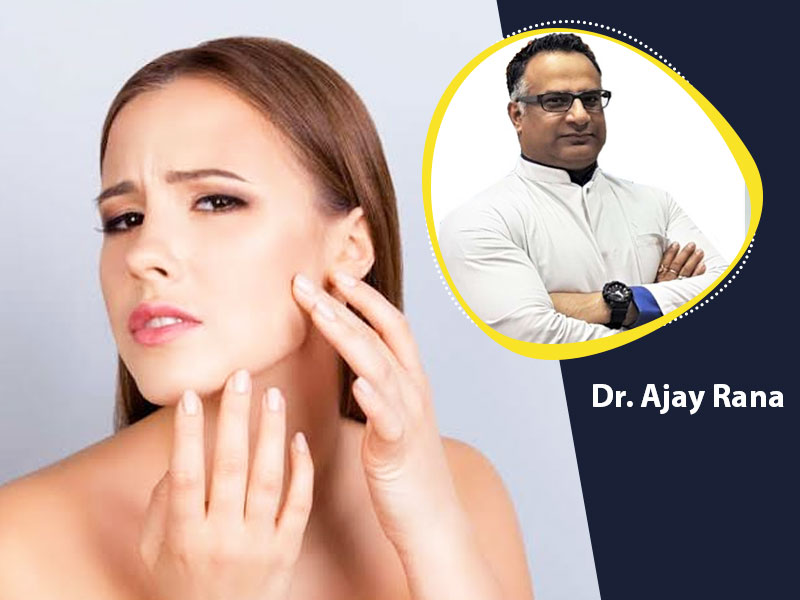
If a person has an oily skin type there there will be an excessive buildup of oil on the face, which keep producing after every few hours even if you clean it. The greasy and shiny appearance on your face will just go away if you follow the expert's advice of overwashing, moisturizing and not using certain cosmetic products. If you do not find a cure for your oily skin, the pores can become clogged and large, thus the production of dead skin cells. The common problems associated with an oily skin are blackheads, pimples and many other types of acne. Onlymyhealth editorial team spoke to Dr. Ajay Rana, world renowned dermatologist and aesthetic physician, about unknown facts about oily skin.
Table of Content:-
Unknown facts about oily skin
According to Dr. Ajay, here are the 7 unknown facts about oily skin:
1. Over washing is best for oily skin
Cleaning the skin with harsh, drying products can make the skin greasier. Using overly harsh washes strips away the natural protective barrier present in the skin that causes the skin to become dry and the body to react by producing too much oil again. So, always stick to gentle cleansers and limit washing your face twice a day to keep skin balanced and healthy.
2. Moisturization is a must for oily skin

If somebody has oily skin, moisturizing is the best way to keep the oil production in check. Stick to light, non-comedogenic formulas that will preserve the skin’s natural defense against spots and blemishes without clogging the pores of the skin.
3. Lifestyle plays a major role
Diet and exercise can have a huge impact on the skin. Keep your blood sugar level balanced as a spike in the hormone can cause the skin to produce excess oil. Foods that contain trans fats should be avoided as it can cause inflammation in the body. Try swapping these for anti-inflammatory healthy fats such as salmon, mackerel, walnuts and avocado. Stress can also cause oily skin; the hormone cortisol is released to help the body manage that stress, which can increase oil production in the skin.
Also read: Top home remedies for oily skin
4. Over exfoliation can be damaging
If somebody has acne or blackhead prone skin, they generally scrub their face to banish those blemishes. This could be damaging the moisture barrier of the skin. Over-exfoliation especially if you have oily skin makes the skin more sensitive, thins down the keratin and risks eczema as a result of irritant processes. So, don’t use harsh scrubs for exfoliation. Always opt for a gentle physical exfoliation that has a naturally effective blend of thyme, zinc and witch hazel. It helps to remove dead skin cells, preventing the buildup of excess oil and dirt in the pores.
5. Oily Skin Is Less Prone to Premature Aging

Dry skin won’t cause wrinkles, but the dryness may bring emphasis to wrinkles, making them look more exaggerated. Compared to dry skin, oily skin shows the sign of aging more slowly. Oily skin is better at holding in natural moisture more than dry skin. A high level of sebum can also help protect the skin against infection and strengthen the body’s antioxidants defense. It works like a natural lid for the skin. When skin cells are moisturised they are able to function much more effectively and produce more collagen, elastin and natural moisturizing factors in the skin that makes the skin healthy.
Also read: Note These Do's and Don'ts If You Have Oily Skin
6. Oily skin is caused due to excessive sebum production
Oily skin can be caused due to sebum production, either hormonal or genetic. Sebum is a substance which hydrates and moisturizes skin. Oily skin can clog the pores of the skin and enlarge, and dead cells will accumulate, which will cause blackhead, pimples, and other types of acne. Geneticity also plays an important role in the causes of oily skin.
7. Use Oil-Based Products Rather than Alcohol-Based Products
Alcohol-based products are known to dry up the skin. Always use products that generate more oil. Use an oil-based cleanser instead; it will attract excess oil and impurities without ripping out the skin moisture.
Also watch this video
How we keep this article up to date:
We work with experts and keep a close eye on the latest in health and wellness. Whenever there is a new research or helpful information, we update our articles with accurate and useful advice.
Current Version